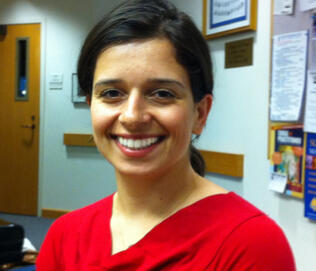
CWA Winner 2012
Shifting Light
When the sun sets, the mood in your room shifts. For the last ten hours it’s been you and I, learning how to move around each other, choreographing our next steps. We have instructed each other on how to speak, listen, touch, and understand. You are tiny; the cancer has whittled away at your flesh and at your strength. Your eyes often watch me as I negotiate this new dance: where to place the tray; how to make the blood pressure cuff fit on your child-size bicep; how to hold you stable. You are lying in bed, waiting to go home to die.
This is a new concept for me. I don’t understand how there is no hope, or how the hope is in finding you a peaceful death. I think, I am too new to this. And yet, during the day you’ve taught me how I can help. You’ve led, too. As I approach the upper right side of your chest, intent to inject medications into your central venous catheter, my hand trembles. I am visibly, most unprofessionally, most humanly, nervous. Kindly, you offer me suggestions: “Put the alcohol wipe on my chest; place the syringe into your right hand” and, when you’ve decided I’m getting the hang of it, you let your head sink back a bit more and close your eyes. The roles are reversed. You are taking care of me.
Your energy is so tapered, so reduced. I hold you as you stumble to the bathroom. I prop you as you brush your teeth. I’m not sure where to look, wanting to give you the dignity of privacy. I avert my gaze and study the floor tiles fiercely. Their boring grey mosaic suddenly intriguing as you rinse and spit, as you teeter on the edge of the toilet, as you sit on the cusp, my arms around you at all times.
And though your energy is flickering, you answer my myriad questions about your life. You materialize, piece by piece, into an individual who is being asked to say goodbye much too soon. You tell me you were a “coffee and cigarettes for breakfast type of woman,” always active, loved being in the yard and doing housework. On Easter weekend you looked at yourself in the mirror and were shocked by how yellow you’d become. The frequent morning diarrhea suddenly seemed ominous. You had met your husband several decades ago at a strip club on New Year’s Eve. And now, you had been given a few months to live.
At one point you turn to me abruptly and ask, “Why do you want to know all this? Why all these questions?” and I don’t know what to respond. Somehow I say, “Because you are more than a cancer patient; you have a whole life, a story behind you, and knowing a bit about it helps me provide you with better care.” Your story and calm spur my words. They help me see you as a person, a wife to be missed by her husband, a woman absent from her community. I think, I am too new to this.
Our day together is punctuated by a bed bath, meals, and a physical assessment where we both are startled by your moaning stomach. I give you meds every few hours. A little after lunch, your brother and his son come to visit. They sit at the foot of your bed, your brother with a big, freaked out smile. His son is not sure where to look.
And our day maintains a smooth veneer. I do not imagine the thoughts that seep into your conscience when you close your eyes or look away, out the window. With the sunlight and activity, it’s easier to avert my eyes and pretend that you are not terrified. Even when you tell me that death is all you think about, I maintain eye contact and nod, but I let the sun’s warmth create a shield, a diversion. Your sadness and fear cannot strike me. It is too big for me to understand.
But now that the sun has set, everything has changed. Your husband, heartbreakingly protective of you, is in the room. He sits by your side; he may be a bit surprised by our bond. I am lucky to have had 10 straight hours with you. I feel he thinks I am an interloper, and I am. I’ve been granted the distinct honor of your company, of your education and patience. With the growing darkness, I can feel death’s presence in the room. I feel it waiting for you. And I am overwhelmed.
You are not comfortable. Your abdomen, which allowed you to bear two sons, has now betrayed you. You cannot get in a good position. The new shift nurse doesn’t have the time that I had. I come in to say goodbye and thank you but I cannot bear the sight of your sadness, your knowledge of Death waiting for you. After assuring you that morphine will be delivered soon, all I can do is help rearrange pillows, stick them in crevices that I think may help, and let my hand rest on your shoulder.
About Samar
Samar Post Jamali graduated Cum Laude from Columbia University in 2002 with a Bachelor of Arts in Russian Regional Studies. She has taught English in Beijing, China, investigated human rights violations in Taiwan, worked for the National Television Academy- Emmy Awards, and most recently was Associate Producer for CNN- Anderson Cooper 360 and American Morning. She is currently in her first year at YSN and will graduate in 2014 as a
Family Nurse Practitioner.
